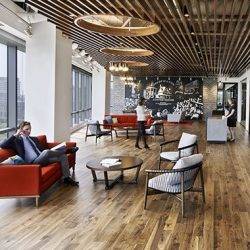To provide the best experiences, we use technologies like cookies to store and/or access device information. Consenting to these technologies will allow us to process data such as browsing behaviour or unique IDs on this site. Not consenting or withdrawing consent, may adversely affect certain features and functions.
The technical storage or access is strictly necessary for the legitimate purpose of enabling the use of a specific service explicitly requested by the subscriber or user, or for the sole purpose of carrying out the transmission of a communication over an electronic communications network.
The technical storage or access is necessary for the legitimate purpose of storing preferences that are not requested by the subscriber or user.
The technical storage or access that is used exclusively for statistical purposes.
The technical storage or access that is used exclusively for anonymous statistical purposes. Without a subpoena, voluntary compliance on the part of your Internet Service Provider, or additional records from a third party, information stored or retrieved for this purpose alone cannot usually be used to identify you.
The technical storage or access is required to create user profiles to send advertising, or to track the user on a website or across several websites for similar marketing purposes.
 The government is to give so-called gig economy workers new rights including holiday and sick pay for the first time. Its new Good Work plan is a direct response to last year’s Taylor Review which recommended changes in conditions to reflect modern working practices and extend the rights of workers in the new economy. The government has said it will proceed with almost all the review’s recommendations including giving zero-hour and agency workers the right to request a more stable contract.
The government is to give so-called gig economy workers new rights including holiday and sick pay for the first time. Its new Good Work plan is a direct response to last year’s Taylor Review which recommended changes in conditions to reflect modern working practices and extend the rights of workers in the new economy. The government has said it will proceed with almost all the review’s recommendations including giving zero-hour and agency workers the right to request a more stable contract.










 Financial services organisations are reducing the amount of commercial office space they require as they adopt more flexible work styles. This is according to a new report from HOK’s US team,
Financial services organisations are reducing the amount of commercial office space they require as they adopt more flexible work styles. This is according to a new report from HOK’s US team, 





 The UK has been ranked as the eighth best country in the world for the ability to attract, retain, train and educate skilled workers, but while its ability to leverage diversity for talent competitiveness is boosted by its global knowledge skills – the UK is undermined by its weaker performance on tolerance and gender equality. According to the Global Talent Competitiveness Index GTCI) produced by the Adecco Group, with international business school INSEAD and Tata Communications, the UK has a particularly strong pool of global knowledge skills, a variable for which it is ranked third in the index boosted further by its strong regulatory, market and business landscape. But this is undermined by its internal openness, where it still lags behind, especially when it comes to gender equality. The report also suggests that although Article 50 was triggered in 2017, the ongoing negotiations and continuing lack of clarity over the UK’s position once it leaves the European Union in 2019, means the impact of Brexit is not yet clear.
The UK has been ranked as the eighth best country in the world for the ability to attract, retain, train and educate skilled workers, but while its ability to leverage diversity for talent competitiveness is boosted by its global knowledge skills – the UK is undermined by its weaker performance on tolerance and gender equality. According to the Global Talent Competitiveness Index GTCI) produced by the Adecco Group, with international business school INSEAD and Tata Communications, the UK has a particularly strong pool of global knowledge skills, a variable for which it is ranked third in the index boosted further by its strong regulatory, market and business landscape. But this is undermined by its internal openness, where it still lags behind, especially when it comes to gender equality. The report also suggests that although Article 50 was triggered in 2017, the ongoing negotiations and continuing lack of clarity over the UK’s position once it leaves the European Union in 2019, means the impact of Brexit is not yet clear.




 Managers are working an extra 44 days a year over and above their contracted hours, up from 40 days in 2015. These long hours are taking their toll, causing a surge in sick leave amongst managers suffering from stress and mental ill health, claims the Chartered Management Institute (CMI), which is calling on UK employers to provide greater support. Long hours and constant communication are having a detrimental effect on the wellbeing of managers it argues resulting in one in ten managers taking time off for mental health in the last year, and for those who do take time out, it’s for an average of 12 days. Of the 1,037 managers surveyed for the report, the average boss puts in an extra day each week. This is an extra 7.5 hours beyond their contracted weekly hours (44.4 hours actual compared to 37.3 contracted), adding up to an extra 43.8 days over the course of the year. This is up from 39.6 days in 2015. The rising gap between contracted and actual hours of work is in addition to an ‘always on’ digital culture, with 59 percent of managers saying they ‘frequently’ check their emails outside of work – up from 54 percent in 2015.
Managers are working an extra 44 days a year over and above their contracted hours, up from 40 days in 2015. These long hours are taking their toll, causing a surge in sick leave amongst managers suffering from stress and mental ill health, claims the Chartered Management Institute (CMI), which is calling on UK employers to provide greater support. Long hours and constant communication are having a detrimental effect on the wellbeing of managers it argues resulting in one in ten managers taking time off for mental health in the last year, and for those who do take time out, it’s for an average of 12 days. Of the 1,037 managers surveyed for the report, the average boss puts in an extra day each week. This is an extra 7.5 hours beyond their contracted weekly hours (44.4 hours actual compared to 37.3 contracted), adding up to an extra 43.8 days over the course of the year. This is up from 39.6 days in 2015. The rising gap between contracted and actual hours of work is in addition to an ‘always on’ digital culture, with 59 percent of managers saying they ‘frequently’ check their emails outside of work – up from 54 percent in 2015.









